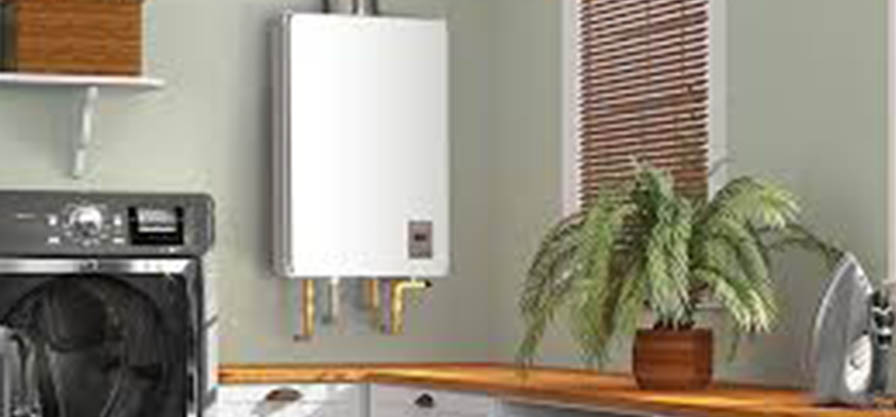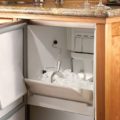Table of Contents
We’ll get directly down to business with our reviews. After presenting 5 of the best tankless water heaters for bathroom and kitchen on the market, we’ll walk you through how to focus on getting the most appropriate one for your needs.
5 Best Tankless Water Heater Reviews

First up in our tankless water heater reviews is the enduringly popular ECO 27 from the industry giant EcoSmart.
For a whole house unit, the price is extremely reasonable and you’ll get all the hot water you need even if you have a bigger home.
Self-modulating Smart Technology means you’ll save plenty of energy without ever running out of hot water and without needing to wait around for it either. You can save an estimated 50% on your power bills.
You can tweak the water temperature by 1-degree increments meaning everyone can have their bath or shower exactly as they like it.
If you’re still in any doubt whatsoever, parts are guaranteed for life which should remove any lingering reservations. Install the ECO 27 today and start recouping your money tomorrow. The only thing to watch out for is that if you opt for a self-install, you’ll void this warranty so get a professional installation to keep it in place.

Pros.
- Digital temperature control by 1 degree increments
- Endless hot water even in larger households
- Highly durable stainless steel and copper components
- Slash your energy consumption by 50%
- Unbeatable lifetime warranty on parts
Cons.
- Temperature of incoming water affects performance
- Self-installation voids warranty

Next up in our tankless water heater reviews is a pocket-friendly 10-liter gas model from MAREY.
Although price is perhaps the driving factor to consider this tankless water heater, it’s no slouch on the performance front either.
With a flow rate in excess of 3 gallons per minute, you’ll be able to serve up all the hot water you need while also paying less for your utilities.
Installation is much more straightforward than with the ECO 27. You’ll get a guide thrown in and if you’re a practical DIY-er, this shouldn’t present too much problem.
Running on 2D cell batteries and either natural gas or propane, kiss goodbye to ruthless electricity bills and say hello to piping hot water on demand.
Although this is a budget tankless water heater, build quality is impressive and you can expect many years of happy service with very little by the way of maintenance required.
The only real downside to the MAREY is a skimpy warranty that doesn’t do much to inspire confidence.

Pros.
- Budget-friendly water heater
- Excellent flow rate
- Propane and natural gas models
- Energy-efficient with no electricity needed
- Extremely easy to operate
Cons.
- Gas heaters can be affected by high altitudes
- Warranty is somewhat lacking

Stepping things up a gear, the Takagi T-KJr2-IN-NG is a strangely named but hard-hitting natural gas tankless heater from a brand you can trust.
Also available as a propane model, the Takagi is a flawed gem. You should know from the onset that you’ll need professional installation to keep the warranty intact. You’ll need steel venting, too, so factor this into the equation. If you’re happy with this, read on to see why the Takagi is such a popular tankless water heater…
Flow rate is class-leading at 6.6GPM. This unit comes into its own in apartments or smaller houses so look elsewhere if you’ve got a larger home.
You can fine-tune the settings with ease even if you’re not a tech-lover.
The wall-mounted unit can deliver power to appliances or plumbing fixtures and you can also integrate it seamlessly with heated baseboards and radiant floor solutions.
For a space-saving and flexible way to get hot water when you need it rather than paying for it around the clock, the Takagi deserves a place on any shortlist of the best tankless water heaters.
Pros.
- Outstanding brand heritage
- 6.6GPM flow rate allows you to power multiple outlets
- Very compact and lightweight
- User-friendly adjustable settings
- Thermistors reduce fluctuations in water pressure
Cons.
- Doesn’t cope well in larger homes
- Needs to be installed by licensed technician
- Steel venting required

As we near the end of our tankless water heater reviews, here’s the classic RTEX-13 from the industry giant Rheem.
This is a point-of-use tankless water heater so you’ll be limited in terms of what appliances you can serve. The flow rate of 4 gallons per minute gives you more than enough grunt for a scalding shower any time you hit the switch.
Installation is a breeze and this is a key selling point since so many tankless water heaters involve a great deal of time and money to set up.
Although this isn’t the cheapest tankless water heater at your disposal, legions of delighted customers report making their money back after just 18 months. With an energy efficiency rating of 99.8% and a unit built to last for years, you’re in safe hands with Rheem.
While the warranty is underwhelming, build quality is such that you shouldn’t need to call for assistance anyway.
Pros.
- Great flow for a single shower
- Capable of paying for itself within 18 months
- 9 different settings on thermostat dial
- Simple installation with wire included
- 99.8% energy efficiency rating
Cons.
- 1-year warranty on parts is pretty disappointing
- Limitations of a point-of-use machine

To polish off our snow shovel reviews, we’ve got something a little different in the form of this extremely efficient electric model from the legendary Snow Joe.

Pros.
- Extremely user-friendly
Cons.
- Pretty noisy
- Can feel slightly uneven
OK ...
Now you have a solid overview of the best tankless water heaters on the market, we’ll wrap things up with a concise guide to streamline your buying decision further.
What Is a Tankless Water Heater?
Put simply, this energy-efficient water heater produces hot water only when it’s called for.
With no tank, you won’t waste time waiting for water to heat up and you won’t waste money either.
If they have no tank, how do these heaters work?
How Do Tankless Water Heaters Work?
Tankless water heaters use heating elements to bypass the need for a storage tank by heating water directly.
When you open the hot water faucet, cold water makes its way to the pipe and is then heated by an electric or gas element depending on the model.
Rather than waiting for a vast tank filled with water to heat up, you’ll have more than enough water for the whole house on tap to be heated as needed. You only limitation is the flow rate of your incoming water.
Most tankless water heaters are capable of generating anywhere from 2 to 5 gallons of hot water per minute. Gas heaters outperform electric variants.
If you regularly find the need for simultaneous hot water – running a bath, say, while also operating the washing machine – you might need to think about installing a pair of heaters.
Tankless vs Traditional Water Heaters
- Convenience: The obvious limitation of storage heaters is that you’re limited by the amount of water held in the tank. Once it’s gone, you simply have to wait. Since tankless water heaters only heat water on demand, you’ll never run out and you’ll always have piping hot water in an instant
- Efficiency: One of the driving reasons for most people purchasing a tankless water heater is energy efficiency. You’ll pay for lots of wasted energy with a storage heater since you’re always heating water even when you don’t need it. By only raising the temperature when necessary, you’ll soon enjoy lowered utility bills
- Installation and Maintenance: Most storage heaters have a lifespan of little more than 10 years. The bulk of warranties are only good for 6 year. Length of warranty usually gives a fairly accurate idea of when to expect problems. After all, manufacturers don’t offer a guarantee expecting to lose out. Although they can be awkward and costly to install, the average warranty for a tankless heater is 15 years and you can expect plenty of faithful service with next to no maintenance
Things To Think About In The Best Tankless Water Heater
To finish up today, here are a few factors you should bear in mind when you’re looking for the best tankless water heater…
Cost
Just as with storage tank heaters, prices vary considerably with tankless water heaters.
You also need to think carefully about the cost of installation before you proceed thinking you’ve got yourself a great bargain. This can be pretty pricey, all the more so if you need a heater outside or fixed to an external wall.
Make sure you do your sums to get the full picture and then relax…
Investing in a tankless water heater will generate savings of up to 50% on your water bills so you won’t regret your decision.
Point of Use or Whole House
Point of use tankless water heaters are much smaller and cheaper to install. They supply a single location and work best in smaller homes.
This type of heater is much more popular in Europe than America where many people dislike the idea of an exposed water heater in the kitchen.
Whole house units are generally installed out of sight and will serve up enough water for your entire family.
Although whole house units require more power, they’re still pretty energy-efficient. Installation costs will be higher.
There’s no right or wrong answer here, simply a question of the type that best fits your needs.
Maximum Flow Rate
The flow rate is the amount of water that the tankless water heater must heat up measured in gallons per minute.
You’ll see most of these on-demand water heaters described using the greatest rise in temperature they can deliver at a particular flow rate.
Never attempt to save money by getting a smaller tankless heater than you need.
Temperature Rise
This is the difference between the temperature of the water coming in and your intended outcome.
All you need to do is subtract the average outside temperature from the 100 to 120 degree band you’d normally want for showering or using the washing machine. That’s your temperature rise.
Installation
Unless you’re really pretty handy, you’ll need to call in for assistance with installation.
You might need some kind of upgrade to your system so do your due diligence and make sure you accurately cost installation to avoid any unpleasant surprises.
A Final Word
By now you should have a solid idea of the best tankless water heater for your needs.
Whether you want an electric or gas unit, the lure of hot water on demand alongside reduced power bills makes tankless water heaters hard to resist.
Come back soon for more great ideas for your home and garden and drop us a line with any questions or feedback you might have.




